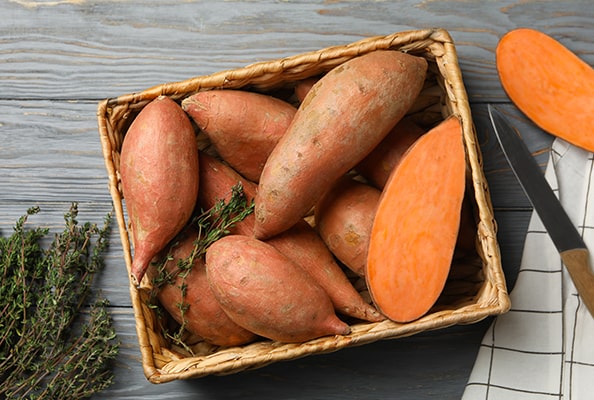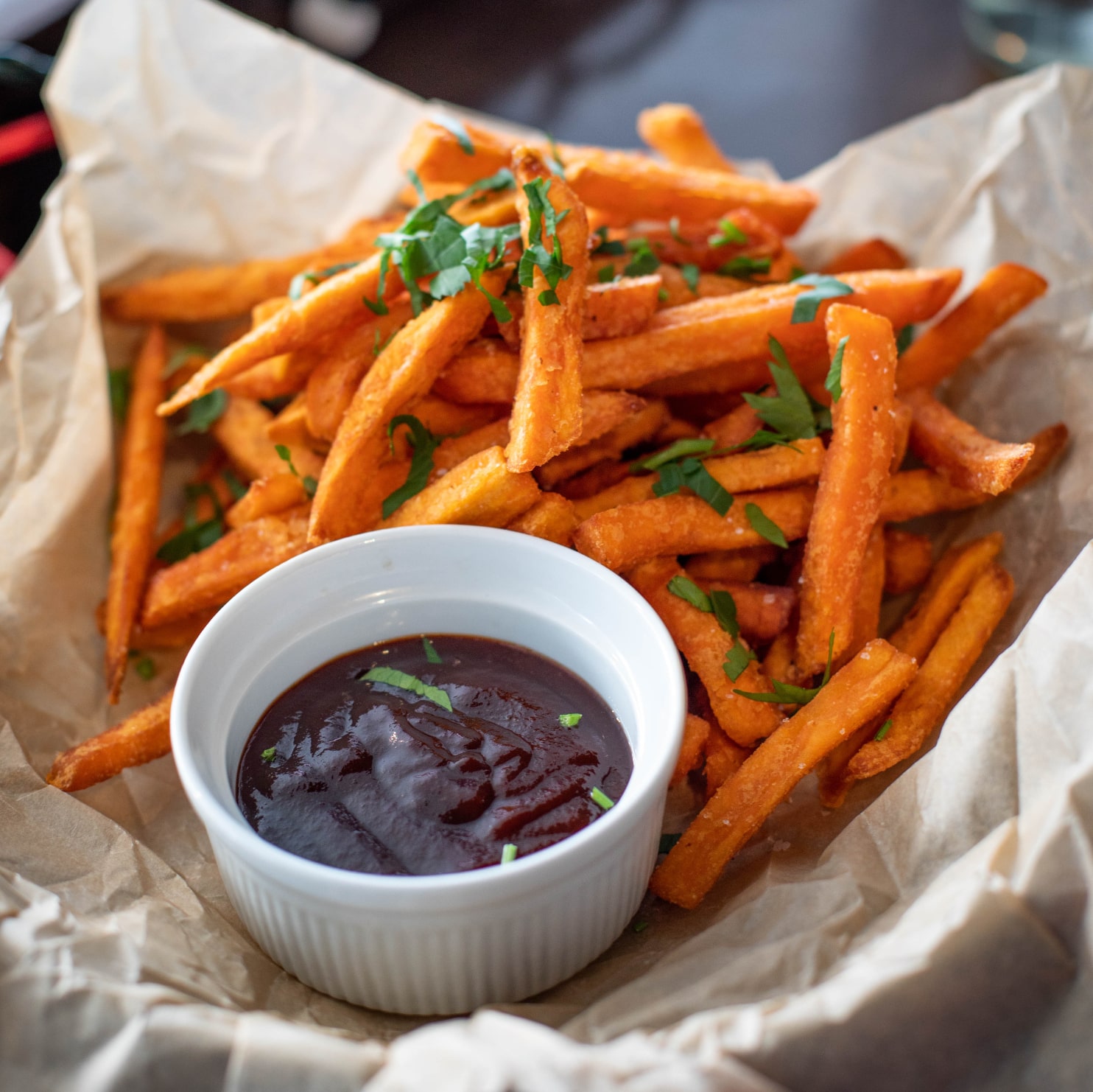A sweet potato is a root vegetable with purple, orange or white flesh, and while it may come as a surprise to many because this vegetable is often referred to as a ‘potato’ or a ‘yam’, they are neither!
Sweet potatoes are actually the root of a vine that belongs to the bindweed family, Convolvulaceae.
They are packed with nutrition, low in calories, and although both the root and leaves are edible, the root of the plant itself is usually sold and eaten.
They are slightly starchy with a mild, sweet flavor (depending on the variety that you purchase), and they are a popular ingredient in many dishes too.
Sweet potatoes are grown in warm to moderate climates across the globe, so while they are native to North and South America, they are also grown in places like Asia and Africa.
When it comes to prep time, they are super easy to work with – all they need is a quick rinse with water and they’re good to go – and they are incredibly versatile in the ways that they can be cooked.
Much like potatoes, sweet potatoes are often cooked before eating and they are also affordable.
Why is Sweet Potato good for me?
The answer here is simple: sweet potatoes have been ranked by nutritionists as the number one most health beneficial vegetable of them all!
Not only are these root vegetables rich in complex carbohydrates, but they are also high in beta-carotene, vitamins (A, B6, C, and E), fiber, potassium, thiamine, niacin, and copper.
Sweet potatoes are a great source of protein and calcium as well, and they are also low in calories.
Offering the lowest glycemic index rating of all root vegetables, sweet potatoes are slow to digest which means that they cause a gradual rise in blood sugar and thus leave you feeling full for longer.
They are essentially a “good carb” – the perfect replacement for foods that are high in sugar and carbohydrates.

Nutritional Information (per 100g):
- 0.1g of fat
- 1.6g of protein
- 20.1g of carbohydrates
- 3g of dietary fiber
- 4.2g of sugar
- 86 calories
Where can I use Sweet Potatoes?
When it comes to sweet potatoes, the possibilities are endless because they are so versatile – they can be roasted, steamed, grilled, fried, boiled, and the list goes on!
Whether you peel and chop them up or not is entirely up to you and your recipe, but the great thing about sweet potatoes is that they are tasty no matter how you choose to prepare them.
Like regular old potatoes, sweet potatoes can be baked whole and topped with butter or sour cream, a good old trusted favorite, but they can also be used in both sweet or savory dishes.
For instance, sweet potato pie and pecan-crusted sweet potato casserole are super popular around the holidays (Thanksgiving, we’re looking at you), and they’re also great to use as substitutes for potatoes in forming the base of soups and roasts.
Did you know sweet potatoes can also be eaten raw?
It’s true! Unlike regular potatoes, sweet potatoes do not contain solanine (a dangerous enzyme that can cause symptoms like stomach pain and fever) so they can also be added in small quantities to your morning smoothie.

What’s cool about Sweet Potato?
One of the coolest things about sweet potatoes is that they are super high in beta-carotene which is a compound that our bodies convert directly into vitamin A, a fat-soluble vitamin that plays an essential role in reducing the risk of certain cancers.
Sweet potatoes are also a good alternative for those who are looking to eat healthier because they contain next to zero fat and are low in calories.
Here’s another fun fact, if you live in the Americas – whether the tag on the product says sweet potato or yam, it’s most likely the former and not actually a yam.
That’s because back in the 1930s, Louisiana farmers began labelling their sweet potatoes as yams instead to set them apart from their competitors, causing decades of confusion.
A yam isn’t even the same kind of species; it’s completely different!
So, really, sweet potatoes are masters at disguise.
Pro tips:
Not sure about how to store sweet potatoes?
Simply keep them at room temperature in an open paper bag or a basket, and make sure that they remain dry.
If and when stored correctly, sweet potatoes can last up to three weeks.
Looking to refrigerate or freeze your sweet potatoes?
If cooked, sweet potatoes can be refrigerated in a closed container for up to four days, and they can also be frozen for up to six months.
However, if raw and cubed, sweet potatoes can be frozen for up to three months maximum, so try to freeze them whole instead.
Looking for the perfect sweet potato to purchase? Keep an eye out for ones with tight skin and firm flesh.
The vegetable will shrivel up and become soft as it goes bad.

Our final thoughts
Sweet potato is much healthier than regular potato; they have a lower GI and more fiber, they are highly nutritious, and they are just as versatile if not more so since they can be used in a number of sweet dishes as well.






